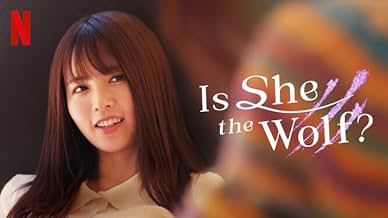IMDb RATING
6.5/10
223
YOUR RATING
A group of ten people, all looking for love. But hidden among the women is at least one saboteur is she really falling for you, or is she the wolf?A group of ten people, all looking for love. But hidden among the women is at least one saboteur is she really falling for you, or is she the wolf?A group of ten people, all looking for love. But hidden among the women is at least one saboteur is she really falling for you, or is she the wolf?
Browse episodes
Featured reviews
Creating a reality/romance/game show where they put 10 participants in an environment that favors love connections and then set rules that intentionally destroy some of these loves connections with lies and deception. No ethical boundaries.. Wow! Seriously?
The concept being so bad that I am surprised that they found people who agreed to participate. Well, most of them being actors and artists its' possible that they went in to get that much needed international exposure even if its' negative. Terrible show? YES. Scripted/fake? There's a very strong possibility. Regrettably, It seems that the show is popular in the Japan this being the 4th season.
The concept being so bad that I am surprised that they found people who agreed to participate. Well, most of them being actors and artists its' possible that they went in to get that much needed international exposure even if its' negative. Terrible show? YES. Scripted/fake? There's a very strong possibility. Regrettably, It seems that the show is popular in the Japan this being the 4th season.
Such a bad thing to deceive people on purpose and have them match for a full 3 months only to find out the one they fell in love with is a "wolf" - a pre-determined selected person to play the roll of the Wolf, which is a person who is a deceiver and has no intention of liking anyone. As a matter of fact, it is their job to lie. As you can imagine, many contestants get truly hurt in this show - including the wolves. Yes, it turns out that there is more than one wolf. Since this show has recruited many actors for contestants, I believe they take the row of wolf thinking they can showcase their acting skills. But is it worth it at the expense of others that have true feelings for someone? Who would ever volunteer to be on this show? The highlighted personalities and nice guy is Robin and also the you youngest guy in the group who is pretty shy.
This is very innovative and wonderful reality show. Also, if you know the anguish and struggle of the women who play the wolves, you can know that it is inappropriate to assume that this is simply a cruel and fraudulent reality show.
As you know, the concept of the show is that a woman playing a wolf deceives men who genuinely want a relationship. However, as the women who play the wolves are also human, they might be gradually develop romantic feelings for their partners. I felt it was really beautiful and pure how the wolves, who were supposed to deceive their opponents at first, gradually come to really love them. So this is by no means just a fraudulent show to fool people, etc., but has also the aspect of a pure romantic reality show with new concepts.
This romantic reality show from Japan is undeniably innovative and addictive, and it will be a breath of fresh air for all who watch it. 'Is She the Wolf?' has disrupted the existing concept of reality shows and taken them to the next stage. Please watch the show all the way through and I can easily guess you will be moved to tears. The ending in particular was so shocking that I wept so much. I watched it over and over again to soak up the emotional aftermath. The show was that much impact. The cast members of the show has also received a lot of praise on their Instagrams from users who watched it. This Japanese reality show is definitely well worth watching.
As you know, the concept of the show is that a woman playing a wolf deceives men who genuinely want a relationship. However, as the women who play the wolves are also human, they might be gradually develop romantic feelings for their partners. I felt it was really beautiful and pure how the wolves, who were supposed to deceive their opponents at first, gradually come to really love them. So this is by no means just a fraudulent show to fool people, etc., but has also the aspect of a pure romantic reality show with new concepts.
This romantic reality show from Japan is undeniably innovative and addictive, and it will be a breath of fresh air for all who watch it. 'Is She the Wolf?' has disrupted the existing concept of reality shows and taken them to the next stage. Please watch the show all the way through and I can easily guess you will be moved to tears. The ending in particular was so shocking that I wept so much. I watched it over and over again to soak up the emotional aftermath. The show was that much impact. The cast members of the show has also received a lot of praise on their Instagrams from users who watched it. This Japanese reality show is definitely well worth watching.
(no real spoilers, only impressions and opinions)
At long last, I decided to give this show a try. Even if I found the original concept initially quite abhorrent, which is why I didn't watch it sooner. Luckily, that concept turned out to resist being realized in a recognizable fashion. And what did materialize, I found to be both endearing and intriguing.
The concept boils down to a single twist on the classic (heterosexual) dating show where people try to find a partner, and that is that at least one and possibly more of the female participants is only pretending to fall for the guy of her dreams. She is a "wolf", whose goal is to lead the guy (or guys) of her choosing into confessing their love for her.
Just let that sink in for a moment: it's not about pretending to be someone you're not, or even about a single mole sabotaging a group effort in a competitive series of survival games (as in the Dutch reality show Who is the mole?). The goal of the wolf or wolves is to make a guy fall for her/them (preferably with heart and soul) and then, during the finale, instead of responding in kind to his romantic confession by handing him the string to a red balloon the lady is holding, letting it slip away at the last moment so that the guy can see it (along with all his hopes for romance with a lady he really fell in love with and whom he firmly believed reciprocated these feelings) float away into the clouds as the lady walks away without uttering even a single word...
A reality show's concept trumped by real people?
The one major problem: the 10 candidates are fairly ordinary, down-to-earth, non-psychopathic Japanese people, with some of them being (minor) celebrities in the world of entertainment, fashion or sports. And although the opening credits may imply otherwise, no one is wearing an actual mask during the show (barring part of the finale). Real people using their real names, with all of the males and at least some of the females earnestly looking for a romantic partner, possibly even the love of their life. Them being Japanese means that all of the myriad Japanese rules of politeness in conversation and conduct apply, which do not mesh well at all with the cloak-and-dagger approach to romance that this show tries to adopt. And them being fairly ordinary (if sometimes slightly famous) people means they have no special aptitude or desire for derailing each other's quest for romance and happiness.
So what ensues, is an endearing display of 10 Japanese men and women with ages ranging from 22 to 32 years of age trying to get to know each other during either dates or group activities that involve (for some reason) old-fashioned analog photography of beautiful nature sites all over Japan. Exactly what about these sweet activities was supposed to fuel the fires of competition and jealousy is never revealed. Nor does it become clear exactly what benefit the candidates might reap from performing these photography quests well. The people behind this show seemed to realize this rather late in the game, since only the outcome of the final photoshoot had an actual stake. Not a very credible stake, since failing to capture the "Heaven's Ladder" effect on film supposedly would have meant that there would have been no finale. (Even though that had initially been promised to the viewers. And anyone watching this made-for-Netflix show can simply check if there is another episode left to watch when these stakes are revealed, thereby instantly removing any suspense this rather random stake might have involved in the first place.)
Shift in focus At the very beginning of the show, one wolf is revealed to the viewer and the commentators. It is shown how she received the role of wolf. The possibility that there are one or more other wolves is left open. The show immediately takes a rather strange turn, in that the wolf's feelings about her role take center stage in the comments she entrusts to the camera. She turns out to have a very specific reason for loathing her having to play that part, which provides a very odd tinge of sadness and suffering to this show that has nothing to do with the candidates trying to figure out who the wolf is. Personally, I would not be surprised if this unexpected drama was given center stage because very few (if any) of the candidates seemed to have much interest in trying to figure out who the wolf is and whether there might be more. This is made painfully clear when the men have to vote for who they think the wolf is (or who the wolves are). The lady with the most votes would be eliminated, but in case of one or more ladies being tied in total number of votes, none would have to leave. Not only is the outcome (which I will not spoil) of this vote delayed from the intended hallway point to the end of episode eight (out of twelve), but the candidates seems mostly concerned about the possibility of their cozy group being broken up. That the wolf/wolves are supposed to be a threat seems to be a far lesser concern. Only after the results have been announced, do some of the participants remark that they should have been focused on outing the wolf/wolves instead of rooting for every single one of the ladies. Due in no small part to both the slow, meandering pace of the show that seems to lack real competitive elements, but also due to the somewhat odd selection of candidates.
The candidates The guys are: Robin (the slightly jaded 32 year-old who has almost given up on love), Tomoki (the rather green and innocent 22 year-old), Taishu (the macho boxer with a heart of gold), Masaki (the samurai actor) and Who-Ya the singer.
The ladies are: Julie (the Chinese-American singer-pianist), Sakurako (who seems to be rather stoic for some time, but opens up eventually), Gabby (half-Japanese and a model?), Honoka (the cutesy yet sometimes almost despondent idol singer) and Mikako (the 28 year-old pianist with a rather serious, almost stern expression).
Problems with the candidates An initial problem that may well have baffled the producers, is that many of the candidates on this dating show started by either reflecting on their experiences with relationships (Robin Masaki) or by even holding back (Gabby, Sakurako and Who-Ya) instead of simply going on dates or even having private conversations with members of the opposite sex. Idol Honoka meanwhile seemed to have trouble to take the whole setup seriously, with her often smirking or giggling in the background during much of the first half of the show. And at the same time the only wolf who had been identified as such kept crying how miserable she felt about the role she had to play. Meanwhile, there seemed to be no dominant opinion among the gentlemen about who might or might not be wolves.
The group activities and the dates Almost without exception, these were fun to watch and provided many heartwarming moments. Although sometimes, candidates let conversations die for reasons that remained unclear. At least, that is what the panel of commentators exclaimed a number of times. Still, I was fascinated observing how one group of Japanese people tries to make sense of how members of another group Japanese people behave towards each other.
Love and suspicions Another aspect that the producers probably weren't happy about, is that most of the candidates fixed on their romantic interest of choice rather quickly. There was fairly little attempt to mix things up and become acquainted with others until fairly late in the season. Perhaps even more painful for whoever came up with this show's concept, is that while some of the men expressed strong romantic feelings toward their lady of choice, at least two were (at least) initially a lot more lukewarm about their choice.
In one case, this early admission of tepid interest is only revealed in the epilogue of the show. It had a devastating on his lady, although it is never made clear if this was sincere or acting (as she turns out to be one of the wolves). And it never really becomes clear why the gentleman in question developed much warmer feelings for his lady later on.
In the other case, the gentleman is almost scientific about the strength of his romantic feelings by qualifying them as being at 65%. Coming after his lady expressed a full 100% commitment to him, this seemed a little too brutally honest. He consequently confides to some of his male competitors that the feeling that she actually might be a wolf gets stronger every time he interacts with her.
The finale After the "Heaven's Ladder" photo is successfully shot after all, there is indeed a finale. Here, the flashy style also seen in the opening credits temporarily returns with each of the ladies that are to receive a declaration of love dressed as a wolf (actually a Goofy suit) and holding a red hot air balloon on a string. As mentioned, they reveal whether they are wolves or not by handing over the string of the balloon to their suitor. (The possibility that they are neither wolves nor willing to accept the gentleman's declaration of love is not an option, for some reason.) The rejected men take their defeat well, with one even declaring that he still appreciates the experience.
An epilogue follows, with the wolves revealing how they felt about their deceit and the rejected gentlemen being consoled by both the other men and the non-lupine ladies. None of the wolves felt good about what they had done, again underlining that what this show's concept required them to do was too much to ask from regular Japanese women who aren't psychopaths. What this show did manage to do right until the finale, was tell a heart-warming story about becoming friends during the many photography trips and becoming more than friends for the couples that managed to find each other. Given how the wolves suffered due to the part they had to play (which was afterwards shown to the rest of the group), it would have been fitting to re-unite them with the others and even.
At long last, I decided to give this show a try. Even if I found the original concept initially quite abhorrent, which is why I didn't watch it sooner. Luckily, that concept turned out to resist being realized in a recognizable fashion. And what did materialize, I found to be both endearing and intriguing.
The concept boils down to a single twist on the classic (heterosexual) dating show where people try to find a partner, and that is that at least one and possibly more of the female participants is only pretending to fall for the guy of her dreams. She is a "wolf", whose goal is to lead the guy (or guys) of her choosing into confessing their love for her.
Just let that sink in for a moment: it's not about pretending to be someone you're not, or even about a single mole sabotaging a group effort in a competitive series of survival games (as in the Dutch reality show Who is the mole?). The goal of the wolf or wolves is to make a guy fall for her/them (preferably with heart and soul) and then, during the finale, instead of responding in kind to his romantic confession by handing him the string to a red balloon the lady is holding, letting it slip away at the last moment so that the guy can see it (along with all his hopes for romance with a lady he really fell in love with and whom he firmly believed reciprocated these feelings) float away into the clouds as the lady walks away without uttering even a single word...
A reality show's concept trumped by real people?
The one major problem: the 10 candidates are fairly ordinary, down-to-earth, non-psychopathic Japanese people, with some of them being (minor) celebrities in the world of entertainment, fashion or sports. And although the opening credits may imply otherwise, no one is wearing an actual mask during the show (barring part of the finale). Real people using their real names, with all of the males and at least some of the females earnestly looking for a romantic partner, possibly even the love of their life. Them being Japanese means that all of the myriad Japanese rules of politeness in conversation and conduct apply, which do not mesh well at all with the cloak-and-dagger approach to romance that this show tries to adopt. And them being fairly ordinary (if sometimes slightly famous) people means they have no special aptitude or desire for derailing each other's quest for romance and happiness.
So what ensues, is an endearing display of 10 Japanese men and women with ages ranging from 22 to 32 years of age trying to get to know each other during either dates or group activities that involve (for some reason) old-fashioned analog photography of beautiful nature sites all over Japan. Exactly what about these sweet activities was supposed to fuel the fires of competition and jealousy is never revealed. Nor does it become clear exactly what benefit the candidates might reap from performing these photography quests well. The people behind this show seemed to realize this rather late in the game, since only the outcome of the final photoshoot had an actual stake. Not a very credible stake, since failing to capture the "Heaven's Ladder" effect on film supposedly would have meant that there would have been no finale. (Even though that had initially been promised to the viewers. And anyone watching this made-for-Netflix show can simply check if there is another episode left to watch when these stakes are revealed, thereby instantly removing any suspense this rather random stake might have involved in the first place.)
Shift in focus At the very beginning of the show, one wolf is revealed to the viewer and the commentators. It is shown how she received the role of wolf. The possibility that there are one or more other wolves is left open. The show immediately takes a rather strange turn, in that the wolf's feelings about her role take center stage in the comments she entrusts to the camera. She turns out to have a very specific reason for loathing her having to play that part, which provides a very odd tinge of sadness and suffering to this show that has nothing to do with the candidates trying to figure out who the wolf is. Personally, I would not be surprised if this unexpected drama was given center stage because very few (if any) of the candidates seemed to have much interest in trying to figure out who the wolf is and whether there might be more. This is made painfully clear when the men have to vote for who they think the wolf is (or who the wolves are). The lady with the most votes would be eliminated, but in case of one or more ladies being tied in total number of votes, none would have to leave. Not only is the outcome (which I will not spoil) of this vote delayed from the intended hallway point to the end of episode eight (out of twelve), but the candidates seems mostly concerned about the possibility of their cozy group being broken up. That the wolf/wolves are supposed to be a threat seems to be a far lesser concern. Only after the results have been announced, do some of the participants remark that they should have been focused on outing the wolf/wolves instead of rooting for every single one of the ladies. Due in no small part to both the slow, meandering pace of the show that seems to lack real competitive elements, but also due to the somewhat odd selection of candidates.
The candidates The guys are: Robin (the slightly jaded 32 year-old who has almost given up on love), Tomoki (the rather green and innocent 22 year-old), Taishu (the macho boxer with a heart of gold), Masaki (the samurai actor) and Who-Ya the singer.
The ladies are: Julie (the Chinese-American singer-pianist), Sakurako (who seems to be rather stoic for some time, but opens up eventually), Gabby (half-Japanese and a model?), Honoka (the cutesy yet sometimes almost despondent idol singer) and Mikako (the 28 year-old pianist with a rather serious, almost stern expression).
Problems with the candidates An initial problem that may well have baffled the producers, is that many of the candidates on this dating show started by either reflecting on their experiences with relationships (Robin Masaki) or by even holding back (Gabby, Sakurako and Who-Ya) instead of simply going on dates or even having private conversations with members of the opposite sex. Idol Honoka meanwhile seemed to have trouble to take the whole setup seriously, with her often smirking or giggling in the background during much of the first half of the show. And at the same time the only wolf who had been identified as such kept crying how miserable she felt about the role she had to play. Meanwhile, there seemed to be no dominant opinion among the gentlemen about who might or might not be wolves.
The group activities and the dates Almost without exception, these were fun to watch and provided many heartwarming moments. Although sometimes, candidates let conversations die for reasons that remained unclear. At least, that is what the panel of commentators exclaimed a number of times. Still, I was fascinated observing how one group of Japanese people tries to make sense of how members of another group Japanese people behave towards each other.
Love and suspicions Another aspect that the producers probably weren't happy about, is that most of the candidates fixed on their romantic interest of choice rather quickly. There was fairly little attempt to mix things up and become acquainted with others until fairly late in the season. Perhaps even more painful for whoever came up with this show's concept, is that while some of the men expressed strong romantic feelings toward their lady of choice, at least two were (at least) initially a lot more lukewarm about their choice.
In one case, this early admission of tepid interest is only revealed in the epilogue of the show. It had a devastating on his lady, although it is never made clear if this was sincere or acting (as she turns out to be one of the wolves). And it never really becomes clear why the gentleman in question developed much warmer feelings for his lady later on.
In the other case, the gentleman is almost scientific about the strength of his romantic feelings by qualifying them as being at 65%. Coming after his lady expressed a full 100% commitment to him, this seemed a little too brutally honest. He consequently confides to some of his male competitors that the feeling that she actually might be a wolf gets stronger every time he interacts with her.
The finale After the "Heaven's Ladder" photo is successfully shot after all, there is indeed a finale. Here, the flashy style also seen in the opening credits temporarily returns with each of the ladies that are to receive a declaration of love dressed as a wolf (actually a Goofy suit) and holding a red hot air balloon on a string. As mentioned, they reveal whether they are wolves or not by handing over the string of the balloon to their suitor. (The possibility that they are neither wolves nor willing to accept the gentleman's declaration of love is not an option, for some reason.) The rejected men take their defeat well, with one even declaring that he still appreciates the experience.
An epilogue follows, with the wolves revealing how they felt about their deceit and the rejected gentlemen being consoled by both the other men and the non-lupine ladies. None of the wolves felt good about what they had done, again underlining that what this show's concept required them to do was too much to ask from regular Japanese women who aren't psychopaths. What this show did manage to do right until the finale, was tell a heart-warming story about becoming friends during the many photography trips and becoming more than friends for the couples that managed to find each other. Given how the wolves suffered due to the part they had to play (which was afterwards shown to the rest of the group), it would have been fitting to re-unite them with the others and even.
Five men and five women spend twelve episodes (three months) travelling around Japan, exploring, taking photos with an analog camera, and trying to find love. The catch is that one (or more) of the women is a "wolf", able to participate in, but ultimately not able to reciprocate with the one who chooses to share her love.
The ten people, ranging from ages 22-32 spend as much time as possible with one another, in small groups or all together, hanging out and sharing meals at the group club house when they can, visiting each other at work, going on sweet romantic dates, and undertaking photography assignments, all while getting to know one another. It's all very endearing and soothing, with breathtaking scenery and heartwarming cameraderie and support one rarely finds in American series of similar type.
I understand that it's a social experiment, but I still don't understand how they could possibly enforce the 'never see one another again' twist. There is no money or other tangible compensation awarded to a successful "wolf". Perhaps it's cultural. The stakes are high and the heartbreak is real. But there are many satisfying moments throughout the series. It was definitely worth my time.
The ten people, ranging from ages 22-32 spend as much time as possible with one another, in small groups or all together, hanging out and sharing meals at the group club house when they can, visiting each other at work, going on sweet romantic dates, and undertaking photography assignments, all while getting to know one another. It's all very endearing and soothing, with breathtaking scenery and heartwarming cameraderie and support one rarely finds in American series of similar type.
I understand that it's a social experiment, but I still don't understand how they could possibly enforce the 'never see one another again' twist. There is no money or other tangible compensation awarded to a successful "wolf". Perhaps it's cultural. The stakes are high and the heartbreak is real. But there are many satisfying moments throughout the series. It was definitely worth my time.
Did you know
- ConnectionsVersion of Okami-chan ni wa Damasarenai (2017)
- How many seasons does Is She the Wolf? have?Powered by Alexa
Details
- Release date
- Country of origin
- Official site
- Language
- Also known as
- Is She the Wolf?
- Production companies
- See more company credits at IMDbPro
Contribute to this page
Suggest an edit or add missing content

Top Gap
By what name was Et si le loup... c'était elle? (2023) officially released in Canada in French?
Answer



























